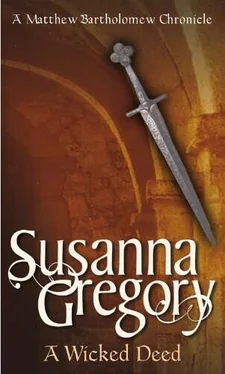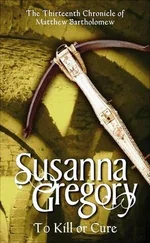Susanna Gregory - A Wicked Deed
Здесь есть возможность читать онлайн «Susanna Gregory - A Wicked Deed» весь текст электронной книги совершенно бесплатно (целиком полную версию без сокращений). В некоторых случаях можно слушать аудио, скачать через торрент в формате fb2 и присутствует краткое содержание. Год выпуска: 2010, ISBN: 2010, Издательство: Little, Brown Book Group, Жанр: Исторический детектив, на английском языке. Описание произведения, (предисловие) а так же отзывы посетителей доступны на портале библиотеки ЛибКат.
- Название:A Wicked Deed
- Автор:
- Издательство:Little, Brown Book Group
- Жанр:
- Год:2010
- ISBN:9780748124411
- Рейтинг книги:3 / 5. Голосов: 1
-
Избранное:Добавить в избранное
- Отзывы:
-
Ваша оценка:
- 60
- 1
- 2
- 3
- 4
- 5
A Wicked Deed: краткое содержание, описание и аннотация
Предлагаем к чтению аннотацию, описание, краткое содержание или предисловие (зависит от того, что написал сам автор книги «A Wicked Deed»). Если вы не нашли необходимую информацию о книге — напишите в комментариях, мы постараемся отыскать её.
A Wicked Deed — читать онлайн бесплатно полную книгу (весь текст) целиком
Ниже представлен текст книги, разбитый по страницам. Система сохранения места последней прочитанной страницы, позволяет с удобством читать онлайн бесплатно книгу «A Wicked Deed», без необходимости каждый раз заново искать на чём Вы остановились. Поставьте закладку, и сможете в любой момент перейти на страницу, на которой закончили чтение.
Интервал:
Закладка:
‘I am hungry,’ he said, not comfortable with the way she looked at him — like she might the lepers from the nearby hospital, who still breathed and walked even though a requiem mass had already been said over their rotting, living bodies. ‘Is the meal ready?’
She shook her head. ‘But it will be by the time you have finished with this sheep.’
She started to leave the butchering shed, to make her way to the house at the top of the garden, but then hesitated, her eyes fixed on the sharp cleaver that dangled from his hand. As if she thought it might be the last time she would see him alive.
‘Be careful, James.’
He watched her walk away, before turning his attention back to the carcass that lay on the bench in front of him. He was about to raise the chopper to continue his work, when he became aware of a shadow in the doorway. Thinking it was only his wife, checking to make sure he did not do something foolish, he did not look up, but started to chop through the sheep’s thigh bone with rhythmic, precise blows.
By the time he realised that the shadow was not his wife, it was too late. He felt a hot, burning sensation somewhere in his head, and then blackness claimed him.
Chapter 1
Suffolk, May 1353
Matthew Bartholomew, doctor of medicine and fellow of Michaelhouse at the University of Cambridge, lay on his stomach in the long grass at the side of the road, and waited. The only sounds were the twittering of a lark from high up in the clouds and the muffled voices of the men who lurked in the deep ditch opposite. One of them gave a low laugh, and Bartholomew thought he heard the faint metallic clink of a sword or a dagger that tapped against a stone. Next to him, his book-bearer, Cynric, tensed suddenly and pointed down the trackway to their left. A small cart was creaking towards them, a ramshackle affair on wheels of different sizes, drawn by a listless horse with bony withers.
The men in the ditch had seen it, too, and fell silent as it rumbled closer. With mounting horror, Bartholomew realised what was about to happen. Dried leaves rustled as he eased himself up on to his elbows, preparing to shout a warning to the man who drove the cart. Cynric grabbed a handful of his tabard and jerked him down again, shooting the physician a look of disgust, appalled that he would compromise their own safety to help a stranger who was probably doomed anyway.
The cart was almost on them, wooden wheels protesting in irregular squeaks and groans as they jolted across ruts that had been baked hard by the early summer sun. The driver, a skinny, undersized man wearing a bell-shaped hat of straw and a rough homespun tunic, was taking fruit to be sold at the market in Ipswich, and a sorry offering of wizened apples, carefully hoarded from the previous year’s crop, rolled around in the back with hollow thumps.
With ear-splitting yells, the men exploded from the ditch, and had surrounded the cart before the driver guessed what was happening. The horse pranced in terror at the sudden noise, and the cart tipped, sending its cargo bouncing across the road. The petrified driver did not wait to hear the robbers’ demands, but scrambled off the cart, and began to race back the way he had come. He tore his purse from his belt as he fled, and hurled it behind him, an astute move that distracted the robbers just long enough to allow him to be out of arrow range when they saw he was escaping.
While the thieves argued over the meagre contents of the purse and unharnessed the frightened horse from the cart, Bartholomew and Cynric eased further back into the scrubby undergrowth and watched them. There were five in all, a rough-looking group of men, who wore shabby clothes and whose faces were masked by bandages. Had they not looked so well-fed and healthy, Bartholomew might have supposed they were lepers, hiding their ravaged features from the world with only their eyes showing through the swaths of dirty grey-brown linen. Three sported hose and jerkins that had probably once been of fine quality, suggesting to Bartholomew that the attack on the would-be apple-seller was not their first ambush of travellers along the Old Road that linked the prosperous city of Ipswich to the Suffolk coast
Since the black days of the plague, which had carried away a third of the country’s population, roadside robbers were becoming increasingly common. Some were simply desperate people who had learned that preying on travellers was an easier and quicker way of earning a loaf of bread than toiling in the fields for pitifully low wages. Others, like the five who argued over the apple-seller’s pennies, were more professional, perhaps veterans from King Edward’s army, who believed England owed them more than a life of labouring on the land after their great victory over the French at the Battle of Crécy in 1346.
‘They will have to attack someone else tonight,’ whispered Cynric to Bartholomew, as he watched the squabble become more acrimonious. ‘There will not be enough in the apple-seller’s purse to satisfy them, and that pathetic nag will not fetch much at the market.’
‘Then what shall we do?’ asked Bartholomew in a low voice. ‘We need to use the road, but it will be dark soon, and if they do not hesitate to attack travellers in daylight, I dread to think what they might be like at night.’
Cynric shrugged. ‘They will not stay here in case the apple-seller fetches the Sheriffs men — they will move further down the road. Therefore, we cannot go on or we will walk right into them, and it is too late to return to the last village we passed.’ He grimaced and glanced at the road, an ancient trackway that ran as straight as the path of an arrow for almost as far as the eye could see. ‘The highways of England are no place for honest men after dusk these days.’
‘So, we cannot go on and we cannot go back,’ concluded Bartholomew. ‘What do you suggest we do? Stay here?’ He looked around with a distinct lack of enthusiasm. While he did not mind sleeping under the stars, particularly when the weather was dry and warm, he did not relish the idea of doing so while there was a ruthless band of outlaws prowling nearby.
‘We will take that path that leads north,’ whispered Cynric promptly, pointing to a gap in the trees to the left. ‘The village of Otley should be a mile or two that way, if my memory serves me right.’
Bartholomew climbed to his feet, anxious to be away from the road before darkness fell. The sun had already set, disappearing in a blaze of gold-red, and the first stars were pinpricking the sky. His travelling companions — three other Michaelhouse Fellows and three students — had been left with the horses a short distance away, bundled to safety when Cynric first became uneasy about the deep ditch to one side of the road, and the low mutter of voices that only he had heard.
But Bartholomew’s haste made him careless, and there was a sharp snap as a twig broke under his foot. Cynric cast him a withering look, and quickly tugged him down again as the robbers immediately fell silent. With horror, Bartholomew saw them draw short swords and move toward the undergrowth in which he and Cynric hid. One gestured to the others and they began to fan out, creeping like shadows through the bushes and trees. Cynric poked Bartholomew in the ribs and indicated that he was to move to his right, away from where the other scholars were waiting to be told whether it was safe to continue their journey. When Bartholomew glanced around, the Welshman was nowhere to be seen, having melted away into the foliage as though he had never been there at all.
Trying to tread lightly, Bartholomew threaded his way through the woods, wincing as leaves crackled under his feet. Then, a triumphant yell told him that he had been spotted. He risked a quick glance backward, and saw one of the men racing toward him, sword held high above his head. Abandoning stealth, Bartholomew turned and ran, crashing through twigs and brambles that scratched his face and tangled themselves around his feet as he went. The medicine bag, which he always wore looped over his shoulder, snagged on branches, slowing him down. He did not need to look behind again to know that the robbers were gaining on him.
Читать дальшеИнтервал:
Закладка:
Похожие книги на «A Wicked Deed»
Представляем Вашему вниманию похожие книги на «A Wicked Deed» списком для выбора. Мы отобрали схожую по названию и смыслу литературу в надежде предоставить читателям больше вариантов отыскать новые, интересные, ещё непрочитанные произведения.
Обсуждение, отзывы о книге «A Wicked Deed» и просто собственные мнения читателей. Оставьте ваши комментарии, напишите, что Вы думаете о произведении, его смысле или главных героях. Укажите что конкретно понравилось, а что нет, и почему Вы так считаете.












